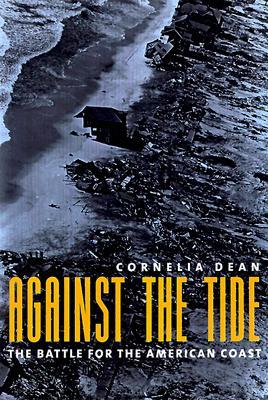File:Against the Tide by Cornelia Dean.jpg: Difference between revisions
Siterunner (talk | contribs) No edit summary |
Siterunner (talk | contribs) No edit summary |
||
| Line 39: | Line 39: | ||
Paperback: 296 pages | ::::Paperback: 296 pages | ||
Publisher: Columbia University Press; Reprint edition (April 15, 2001) | ::::Publisher: Columbia University Press; Reprint edition (April 15, 2001) | ||
Revision as of 11:42, 9 April 2019
Against the Tide
by Cornelia Dean
https://www.goodreads.com/book/show/815362.Against_the_Tide
https://www.amazon.com/Against-Tide-Cornelia-Dean/dp/0231084196
- - - - -
Castles built on sand are doomed, they say. But in our hunger for an ocean view from the living-room window, we keep building things we expect to last on beaches that never stay still. In Against the Tide, Cornelia Dean, science editor of The New York Times, outlines the global coastal management crisis and all the elaborate engineering methods developed to stave off erosion--revetments, sand-trapping devices, seawalls, groins and jetties, even artificial seaweed beds. In clear, journalistic style, she explains how all of these devices have failed to stop the inexorable march of coastal erosion. And they've failed at a staggering cost to taxpayers, despite the fact that they're usually deployed to protect private property. The world's sandy beaches continue eroding, and nowhere is this more visible than in the U.S., where oceanfront construction has been proceeding at a fast and furious pace for decades. Of course, the perfectly natural process of erosion is only considered a "problem" if it threatens buildings or property. Dean writes: "There is a kind of constituency of ignorance, people who have so much invested in coastal real estate that they do not want to hear how vulnerable it is."
- - - - -
Publisher's Weekly
Dean's book is a lucid primer on coastal engineering; it is also an appalling tale of shortsightedness, greed and willful ignorance, as property owners and developers square off against environmentalists and beach preservationists. It opens with a dramatic account of the hurricane that blasted Galveston, Tex., in 1900, leading the city to make a "Faustian bargain" by erecting a seawall that hastened the beach's demise. Dean sees Hurricane Andrew's devastation of the Gulf Coast in 1992 as a warning about overdevelopment of the shore and the failure to make houses hurricane-resistant. As the book's title suggests, Dean's call for restraint in building, strategic retreat and conservation of our shores goes against the current, but it is well worth listening to, especially as many climatologists predict rising sea levels due to global warming.
- - - - -
Reader Review:
Cornelia Dean Deserves The Pulitzer Prize
By Dr. Bill Wargo on September 2, 1999
Format: Hardcover
I don't know Cornelia Dean but I wish she was my neighbor. This daring, wonderful, woman should be given a national award for her works in "Against the Tide." She blows the whistle on widespread negligent coastal management practices that are evident everywhere. It was extremely unsettling to me to read about almost identical patterns of coastal abuse that I have observed where I live at Alligator Point, Florida. A revetment was constructed in 1994 despite the warnings of coastal experts that it would contribute further to erosion rather than preventing it. This was done at a staggering waste of taxpayers' money and with the permission of county, state, and federal governments. Today, the beach area that once provided recreation and a protective buffer is gone because of revetment-caused erosion. Turtle areas are destroyed. Dwellings are sitting dangerously in water. The road is ruined and unsafe. And, there is no required accountabilty for removing the wall. It is now a permanent monument to disaster. Cornelia Dean articulately reveals how shamefully common this is. She has superbly documented the inept practices of coastal management efforts that are prevalent all along America's coasts. Nothing was written, however, about how to undo this American tragedy. I will, therefore, offer one suggestion based on Cornelia Dean's numerous contacts and her rapport with coastal planners. She should be given a special Presidential appointment to head up a commission to consolidate all coastal management agencies and to develop and enforce a unified set of standards. Ms. Dean's outstanding book certainly qualifies her for such a step.
- Paperback: 296 pages
- Publisher: Columbia University Press; Reprint edition (April 15, 2001)
• https://www.amazon.com/Against-Tide-Cornelia-Dean/dp/0231084196/
• http://www.nytimes.com/books/first/d/dean-tide.html
An eloquent, forceful plea to save America's rapidly eroding beaches and coastline, this revelatory and disturbing report from the science editor of the New York Times is reminiscent of Rachel Carson's Silent Spring...
(Review from Publishers Weekly) In Against the Tide, Cornelia Dean, science editor of The New York Times, outlines the global coastal management crisis and all the elaborate engineering methods developed to stave off erosion-- revetments, sand-trapping devices, seawalls, groins and jetties ...
• https://en.wikipedia.org/wiki/Seawall
In clear, journalistic style, Cornelia Dean explains how all of these (man-made) devices have failed to stop the inexorable march of the sea...
From the motels and T-shirt shops of beachless Florida "beach towns" to Los Angeles County, most of whose beaches are artificial, the story Dean tells is the same. People build on unstable landforms, then attempt to avoid the inevitable consequences through quick technological fixes: concrete seawalls, artificial reefs, sand-trapping steel groins, jetties, underground "dewatering" systems of pipes and pumps, etc.
These techno-fixes may prolong the life of coastal buildings, but they usually accelerate erosion and environmental degradation...
○
GreenPolicy360:
"Living Coastlines, Living Shorelines"
Viable, smart alternatives to preserve and protect against extreme weather events, sea-level rise, tidal flows, wave action
https://www.greenpolicy360.net/w/Living_coastline
○
File history
Click on a date/time to view the file as it appeared at that time.
| Date/Time | Thumbnail | Dimensions | User | Comment | |
|---|---|---|---|---|---|
| current | 13:28, 3 January 2017 |  | 600 × 800 (265 KB) | Siterunner (talk | contribs) |
You cannot overwrite this file.
File usage
The following 4 pages use this file:
